Oyster Oyster Restaurant
1440 8th St NW, Washington, DC 20001
www.oysteroysterdc.com
Tue 11/28/2023, 06:50p-09:10p
![Oyster Oyster Exterior]()
Oyster Oyster had been on my DC "to-eat" list for a couple years now, but the place had always been a tough reservation to snag given that it generally books up at least a month out. Fortunately, on my latest business trip to the District, I was able to land a ressie through a cancelation. Named after the mushroom and the bivalve, Oyster Oyster is a plant-focused eatery that serves a vegetarian menu that can be made vegan or, more interestingly, "oystertarian." Oysters are permitted given their sustainable role in the local ecosystem, and the fact that they apparently don't have brains and thus don't feel pain. The partners here are Chef Rob Rubba and Max Kuller, both of whom have been around the DC dining scene for quite a while.
About the Chef: Robert Hal Rubba Jr was born in April 1982, and grew up in Northfield in southern New Jersey. He got interested in food at an early age, but didn't seriously consider a culinary career until later on. In order to pay for his studio while attending college for fine arts in the early 2000s, he got a summer job working in the pastry department at Mohegan Sun, a hotel/casino in Uncasville, Connecticut where his uncle was a chef. He quickly fell in love with the craft, dropped out of art school, enrolled in culinary school, and dropped out of culinary school. He then switched over to the savory side of things and, in 2005, started working at Todd English's Tuscany, which was also conveniently located at Mohegan Sun. In 2006, Rubba moved to New York and joined the team at Gordon Ramsay at The London, but relocated to Las Vegas the following year.
He cooked at Restaurant/Bar Charlie, then transitioned to Guy Savoy, where he stayed until 2009. From there, he went to Chicago for a chef de partie gig at L2O, where he helped Laurent Gras achieve three Michelin stars. Rubba left in 2010 to become CdC at Chizakaya, an izakaya concept opened up by Harold Jurado, another Charlie Trotter alum. His post there was short-lived, though, and by 2011, the Chef was back in NYC, where he launched the pork-focused CrossBar for his old boss, Todd English. However, he soon decamped to open Mihoko's 21 Grams; the place debuted in April 2012, but Rubba was already out the door by July. He then went to Philadelphia and worked for a few months at the second iteration of Georges Perrier's iconic Le Bec-Fin, but shortly moved down to DC.
The Chef cooked for a moment at Frederik De Pue's Azur, which only lasted from April to September 2013. He linked up with Neighborhood Restaurant Group that November, and was brought on board as EC of Tallula, one of the company's properties in Arlington. Tallula, however, closed a year later, and Rubba was made interim chef at Columbia Firehouse in Alexandria. By that time, Rubba and NRG were already working on their next project together, Hazel, which debuted in June 2016 and achieved considerable acclaim. Even so, the Chef began having misgivings about the waste and negative impacts intrinsic to the restaurant industry, and thus, decided to become a vegetarian in late 2017 and focus his efforts on sustainability. He therefore resigned from his role at Hazel in June 2018, shortly after teaming with sommelier Max Kruller (of Estadio fame) and bartender Adam Bernbach (who left the partnership in January 2021) to open Oyster Oyster.
After holding a series of pop-ups, the trio signed a lease on a space in Shaw, and had planned to launch the restaurant in late March 2020. The pandemic, obviously, had different plans, and they were thus forced to retool, turning the space into a bagel bar, a pizza joint, and a takeout spot before instituting outdoor dining in spring 2021. Indoor dining followed in June that year, and by October, Oyster Oyster had secured the #1 spot on Tom Sietsema's 2021 Fall Dining Guide, while November saw recognition in Esquire's Best New Restaurants in America list. In March 2022, Oyster Oyster received both a "Best New Restaurant" nomination from James Beard and a Michelin star. Rubba landed a spot on Food & Wine's Best New Chefs list in September last year, while a James Beard "Outstanding Chef" win came just this June.
![Oyster Oyster Interior]()
![Oyster Oyster Interior]()
Oyster Oyster resides at the City Market at O mixed-use development. The roughly 1,000 square-foot space was designed by the team over at GrizForm Design Architects with sustainability in mind, and has a bit of a diner-style aesthetic. Capacity is reportedly 28. Do note that there was also a so-called "Oyster Garage" next door, which opened in July sporting pinball machines and serving a menu of oysters and pizza. However, it's since been shut down, and is being converted to a private dining room.
![Oyster Oyster Kitchen Counter]()
The restaurant also makes use of a kitchen counter, and pictured above is the view from my seat at the end.
![Oyster Oyster Kitchen Counter Menu]()
![Oyster Oyster Wines by the Glass List]()
![Oyster Oyster Wine List: Sparkling, White]()
![Oyster Oyster Wine List: Skin Contact, Red]()
Tonight's "Harvest" menu at the chef's counter was priced at a pre-paid $125 a head, plus $12.50 tax and $27.50 service; in comparison, a (slightly shorter) meal in the dining room costs $105. Optional wine pairings are available at $85/$70, while a non-alcoholic pairing is $55. In addition, we see the restaurant's beer/cider/wine list, which focuses on low-intervention and local producers. Do note that the menu is apparently printed on recycled paper that's embedded with marigold(?) seeds, and thus can actually be planted. Said menu also ended up being signed by the entire BOH team, which was a nice touch: Robert Rubba, Daniel "Danny" Bravato, Dana Laos, Vincent Ho, Evan Liwerant, Alex Fiszbein, and Salbador Gomez. Click for larger versions.
![Hot Towel]()
An oshibori-style warm hand towel was provided soon after I sat down, which was a welcomed nicety.
![Welcoming Broth]()
1: Welcoming Broth
I was then presented with a cup of warm broth, one showcasing the zestiness of young ginger up front before leading to the growing woodsiness of shiitake mushroom. This was deeply savory and heartwarming, yet somehow light at the same time, and served as a great welcome given the very chilly whether we'd been having in DC.
![Kyoto Carrots]()
2: Kyoto Carrots | Smoked Tofu, Sauerkraut, Rye Flatbread
Here we had a decidedly untraditional taco of sorts, one that displayed the sweet, piquant nature of pastrami-roasted carrots and sauerkraut, set against a smoked tofu purée and the herbiness of dill. This was all contained in a supple, floppy rye-caraway seed flatbread "tortilla," making for a rather fun start. I will also note here that the plate utilized in this course was made from recycled wine bottles--just another part of the restaurant's efforts to reduce waste.
![Troddenvale, Special Edition #8, Rosé Crab Apple Cider, VA '21]()
To drink, I went for a bottle of the Troddenvale, Special Edition #8, Rosé Crab Apple Cider, VA '21 [$65], made from an equal blend of Dolgo crab apples and White Winter Pearmain apples, pressed in 2021, fermented in neutral French oak, and aged sur lie for five months. The cider showed off a lovely nose filled with funk and florals, with a fruity backing. On the palate, I found this dry and earthy, but with juicy apple flavors adding enough sweetness to the mix. Very tasty overall, and a good match to the food.
![Confit Badger Flame Beets]()
3: Confit Badger Flame Beets | Sweet Potato XO, Perilla Capers, Kelp
My oyster course was a winner, with the brine of the bivalve really standing up to the sweetness of those beets. I appreciated the freshness imparted by the shiso as well, but my favorite component was that XO sauce, which conveyed both sweetness and a wonderfully nutty depth--it really brought the dish together.
![Koji Marinated Kohlrabi]()
4: Koji Marinated Kohlrabi | Foraged Mushrooms, Cauliflower, Chervil
This next dish was another highlight, and featured kohlrabi marinated overnight in koji, roasted for caramelization, then slow-poached in a broth made from kohlrabi scraps. The veggie was paired with puréed cauliflower as well as a medley of roasted mushrooms (lion's mane, blue oyster, black king trumpet, pioppini, chestnut). This all made for a super cozy, comforting course with a bevy of buttery, bitter, nutty, and savory flavors all working in harmony.
![Oyster Oyster Candle]()
Discarded oyster shells are turned into candles, and I believe even the wax is made from used cooking oil.
![Badger Flame Beet Bread]()
5: Badger Flame Beet Bread | Marigold "Butter"
Along with the kohlrabi came the bread, which had this delightful crustiness to it, while its crumb was properly tender, with a subtle, earthy bitterness thanks to the use of juiced beet scraps for dough hydration. The butter was also commendable. Made from sunflower seeds and marigold flowers, it had a gratifyingly thick consistency, with a smoky, nutty, almost "cheesy" taste that I reveled in.
![Potato]()
6: Potato | Truffle, Terra-Cotta, Vegetable Reduction
Celery root noodles were spot-on texturally, and were paired with a creamy, nearly cheesy "terra-cotta" made from pumpkin seeds. I was a big fan of the salt and crunch provided by the fried potato bits, while a rich, demi-glace-ish veggie reduction made from carrot/onion scraps (caramelized, then cooked down with red wine, garlic, and herbs) helped bind everything together. However, what struck me the most here was that North Carolina truffle, which had apparently been in work for 30 years. The shavings had this super pungent, almost lactic funk that I loved, which served as the perfect exclamation point to the dish.
![Stuffed Cabbage]()
7: Stuffed Cabbage | Koginut Squash, Cypress Rice, Sauce of Seeds
My final savory course was a two-parter. In the front was Savoy cabbage, stuffed with a sticky, super nutty, aromatic rice that I was pretty enamored with, along with braised greens. I also had a subtly sweet semicylinder of roasted squash, topped with a wonderfully nutty, chocolate-y, mole-like sauce based on sesame and pumpkin seeds. Meanwhile, garnishing both parts were matsutake mushrooms, which were as spicy and "wild" tasting as I was hoping for.
![Oyster Oyster After Dinner Drink List]()
I requested a list of after-dinner beverages to pair with dessert below. Click for a larger version.
![Orchid Cellars, 'Archer', Mead, Middletown, MD, NV]()
Since I was in the mood for something different, I choose the Orchid Cellars, "Archer", Mead, Middletown, MD, NV [$16], a honey-lemon wine fermented with cinnamon, clove, and juniper, then aged 18 months. The metheglin demonstrated a minty, fruity bouquet with an almost amaro-like character. Taste-wise, I got heady notes of cacao and bittersweet spices, all layered over a honeyed backbone.
![Paw Paw Tart]()
8: Paw Paw Tart
I feel that pawpaw is an underutilized native ingredient, so I was happy to see it on the menu tonight. Combined with bitter lemon vinegar and crème anglaise, the fruit had this tropical, yet earthy quality that I really enjoyed, and which married easily with that crispy, flaky buckwheat shell.
![Apple]()
9: Apple | Apple Cake, Hickory Nut Mousse, Buckwheat
My second dessert was very apropos for the season. I was impressed by its caramel-like richness and how the juiciness of Pink Lady apple was presented. Just as important was that nutty mousse made from foraged hickory nuts, while a drizzle of grassy fig leaf oil and a sprinkling of crispy candied buckwheat completed the package.
![Loew Vineyards, 'Apples & Honey', Semi-Sweet Wine, Mt. Airy, MD, NV]()
I was then provided a complimentary pour of the Loew Vineyards, "Apples & Honey", Cyser, Mt. Airy, MD, NV, made from a blend of apples and both wildflower and clover honey. The bouquet here was fresh and sweet, and actually reminded me of apple pie. Taste-wise, I found this generally easy-going, with tart fruit supported by an undercurrent of blue cheese-like earthiness.
![Shiitake Chip Cookie]()
10: Shiitake Chip Cookie
Last up was a whimsical bite that married your classic cookie flavors with some unexpectedly woodsy, nutty nuances.
Rubba and his team delivered a strong meal tonight, and I can see why so many people like this place. The cuisine was inventive and intentional, invigorating and imaginative, and I definitely got that sense of sustainability that's part of Oyster Oyster's mission. There's a real sense of confidence in the cooking, and not once did I miss the meat. This is vegetarian food that shouldn't leave the meat-eaters wanting.
1440 8th St NW, Washington, DC 20001
www.oysteroysterdc.com
Tue 11/28/2023, 06:50p-09:10p

Oyster Oyster had been on my DC "to-eat" list for a couple years now, but the place had always been a tough reservation to snag given that it generally books up at least a month out. Fortunately, on my latest business trip to the District, I was able to land a ressie through a cancelation. Named after the mushroom and the bivalve, Oyster Oyster is a plant-focused eatery that serves a vegetarian menu that can be made vegan or, more interestingly, "oystertarian." Oysters are permitted given their sustainable role in the local ecosystem, and the fact that they apparently don't have brains and thus don't feel pain. The partners here are Chef Rob Rubba and Max Kuller, both of whom have been around the DC dining scene for quite a while.
About the Chef: Robert Hal Rubba Jr was born in April 1982, and grew up in Northfield in southern New Jersey. He got interested in food at an early age, but didn't seriously consider a culinary career until later on. In order to pay for his studio while attending college for fine arts in the early 2000s, he got a summer job working in the pastry department at Mohegan Sun, a hotel/casino in Uncasville, Connecticut where his uncle was a chef. He quickly fell in love with the craft, dropped out of art school, enrolled in culinary school, and dropped out of culinary school. He then switched over to the savory side of things and, in 2005, started working at Todd English's Tuscany, which was also conveniently located at Mohegan Sun. In 2006, Rubba moved to New York and joined the team at Gordon Ramsay at The London, but relocated to Las Vegas the following year.
He cooked at Restaurant/Bar Charlie, then transitioned to Guy Savoy, where he stayed until 2009. From there, he went to Chicago for a chef de partie gig at L2O, where he helped Laurent Gras achieve three Michelin stars. Rubba left in 2010 to become CdC at Chizakaya, an izakaya concept opened up by Harold Jurado, another Charlie Trotter alum. His post there was short-lived, though, and by 2011, the Chef was back in NYC, where he launched the pork-focused CrossBar for his old boss, Todd English. However, he soon decamped to open Mihoko's 21 Grams; the place debuted in April 2012, but Rubba was already out the door by July. He then went to Philadelphia and worked for a few months at the second iteration of Georges Perrier's iconic Le Bec-Fin, but shortly moved down to DC.
The Chef cooked for a moment at Frederik De Pue's Azur, which only lasted from April to September 2013. He linked up with Neighborhood Restaurant Group that November, and was brought on board as EC of Tallula, one of the company's properties in Arlington. Tallula, however, closed a year later, and Rubba was made interim chef at Columbia Firehouse in Alexandria. By that time, Rubba and NRG were already working on their next project together, Hazel, which debuted in June 2016 and achieved considerable acclaim. Even so, the Chef began having misgivings about the waste and negative impacts intrinsic to the restaurant industry, and thus, decided to become a vegetarian in late 2017 and focus his efforts on sustainability. He therefore resigned from his role at Hazel in June 2018, shortly after teaming with sommelier Max Kruller (of Estadio fame) and bartender Adam Bernbach (who left the partnership in January 2021) to open Oyster Oyster.
After holding a series of pop-ups, the trio signed a lease on a space in Shaw, and had planned to launch the restaurant in late March 2020. The pandemic, obviously, had different plans, and they were thus forced to retool, turning the space into a bagel bar, a pizza joint, and a takeout spot before instituting outdoor dining in spring 2021. Indoor dining followed in June that year, and by October, Oyster Oyster had secured the #1 spot on Tom Sietsema's 2021 Fall Dining Guide, while November saw recognition in Esquire's Best New Restaurants in America list. In March 2022, Oyster Oyster received both a "Best New Restaurant" nomination from James Beard and a Michelin star. Rubba landed a spot on Food & Wine's Best New Chefs list in September last year, while a James Beard "Outstanding Chef" win came just this June.
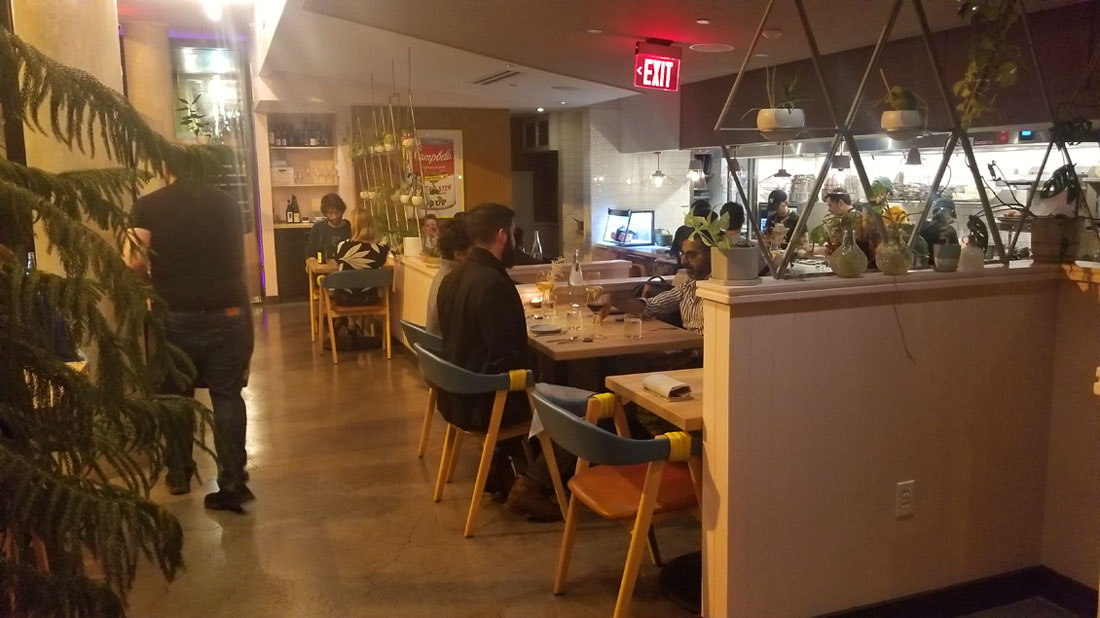
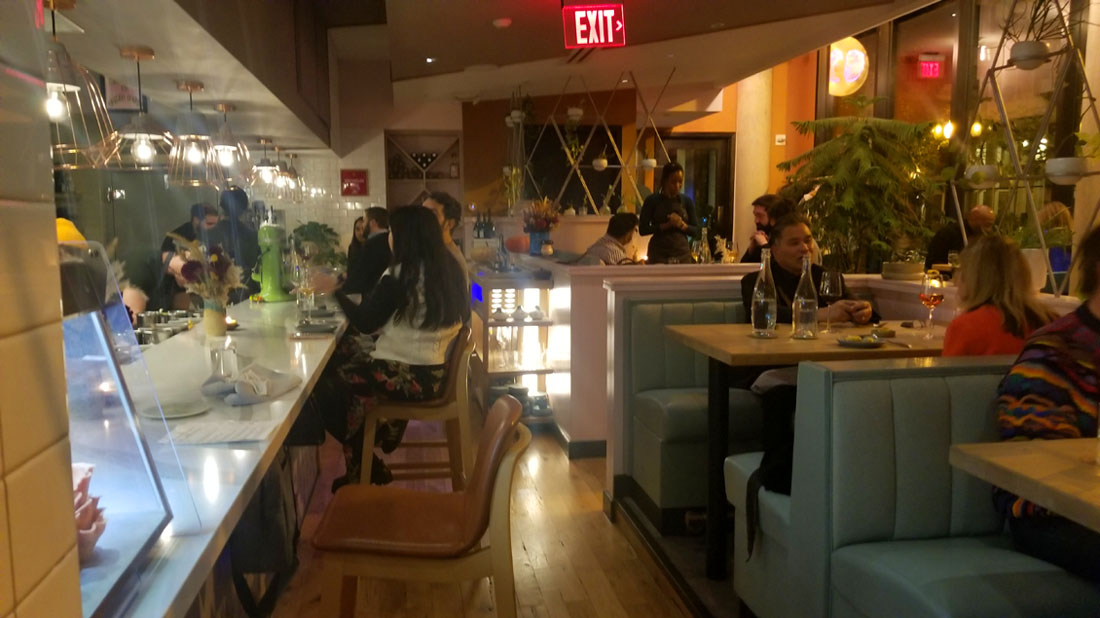
Oyster Oyster resides at the City Market at O mixed-use development. The roughly 1,000 square-foot space was designed by the team over at GrizForm Design Architects with sustainability in mind, and has a bit of a diner-style aesthetic. Capacity is reportedly 28. Do note that there was also a so-called "Oyster Garage" next door, which opened in July sporting pinball machines and serving a menu of oysters and pizza. However, it's since been shut down, and is being converted to a private dining room.

The restaurant also makes use of a kitchen counter, and pictured above is the view from my seat at the end.
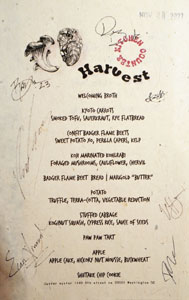
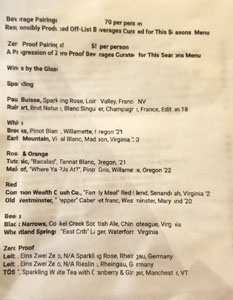
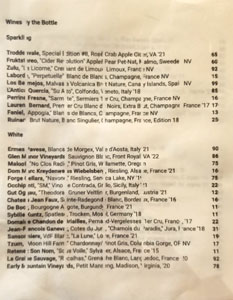
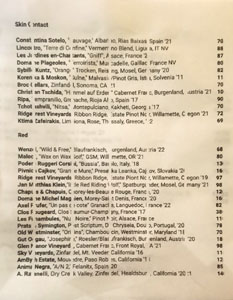
Tonight's "Harvest" menu at the chef's counter was priced at a pre-paid $125 a head, plus $12.50 tax and $27.50 service; in comparison, a (slightly shorter) meal in the dining room costs $105. Optional wine pairings are available at $85/$70, while a non-alcoholic pairing is $55. In addition, we see the restaurant's beer/cider/wine list, which focuses on low-intervention and local producers. Do note that the menu is apparently printed on recycled paper that's embedded with marigold(?) seeds, and thus can actually be planted. Said menu also ended up being signed by the entire BOH team, which was a nice touch: Robert Rubba, Daniel "Danny" Bravato, Dana Laos, Vincent Ho, Evan Liwerant, Alex Fiszbein, and Salbador Gomez. Click for larger versions.
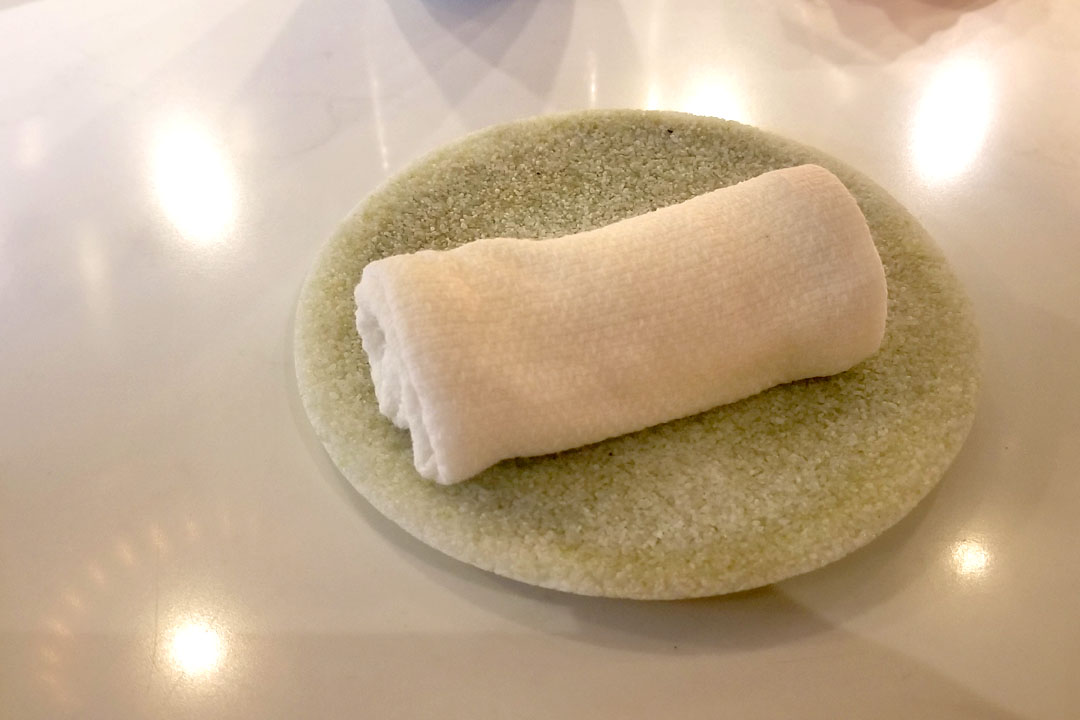
An oshibori-style warm hand towel was provided soon after I sat down, which was a welcomed nicety.
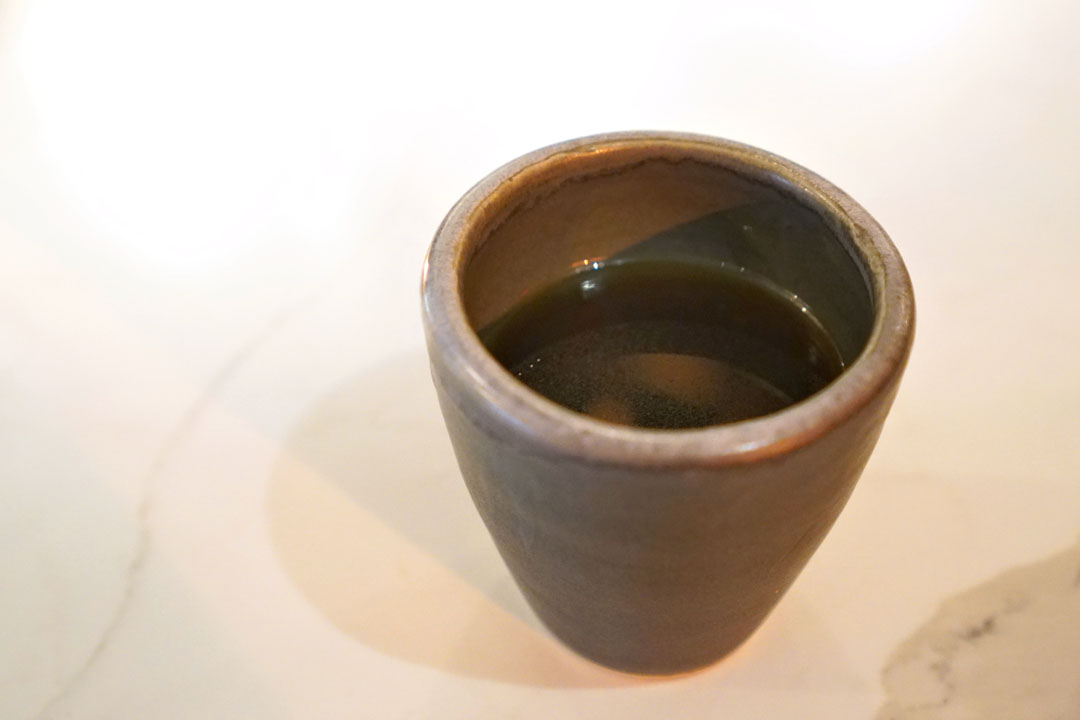
1: Welcoming Broth
I was then presented with a cup of warm broth, one showcasing the zestiness of young ginger up front before leading to the growing woodsiness of shiitake mushroom. This was deeply savory and heartwarming, yet somehow light at the same time, and served as a great welcome given the very chilly whether we'd been having in DC.
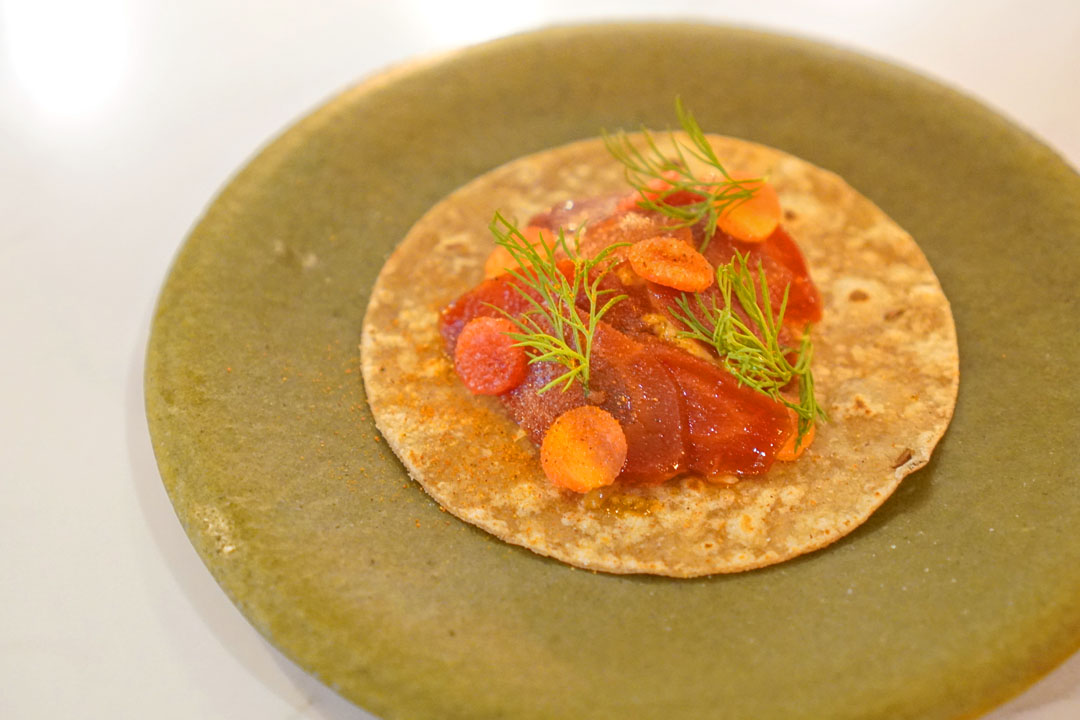
2: Kyoto Carrots | Smoked Tofu, Sauerkraut, Rye Flatbread
Here we had a decidedly untraditional taco of sorts, one that displayed the sweet, piquant nature of pastrami-roasted carrots and sauerkraut, set against a smoked tofu purée and the herbiness of dill. This was all contained in a supple, floppy rye-caraway seed flatbread "tortilla," making for a rather fun start. I will also note here that the plate utilized in this course was made from recycled wine bottles--just another part of the restaurant's efforts to reduce waste.
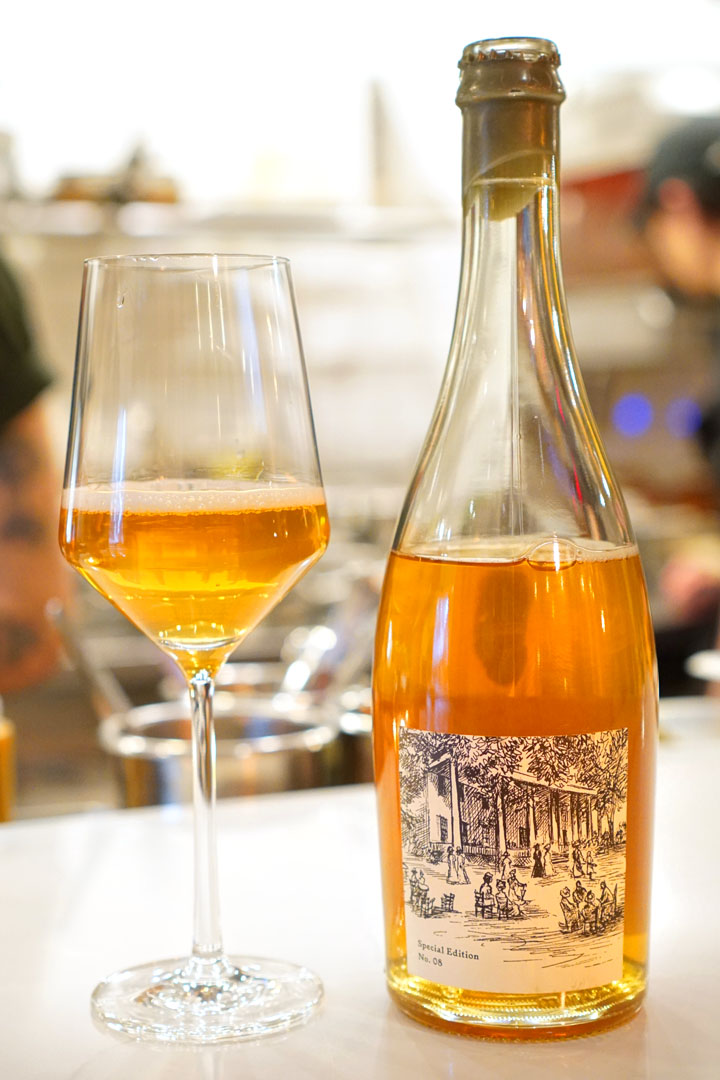
To drink, I went for a bottle of the Troddenvale, Special Edition #8, Rosé Crab Apple Cider, VA '21 [$65], made from an equal blend of Dolgo crab apples and White Winter Pearmain apples, pressed in 2021, fermented in neutral French oak, and aged sur lie for five months. The cider showed off a lovely nose filled with funk and florals, with a fruity backing. On the palate, I found this dry and earthy, but with juicy apple flavors adding enough sweetness to the mix. Very tasty overall, and a good match to the food.
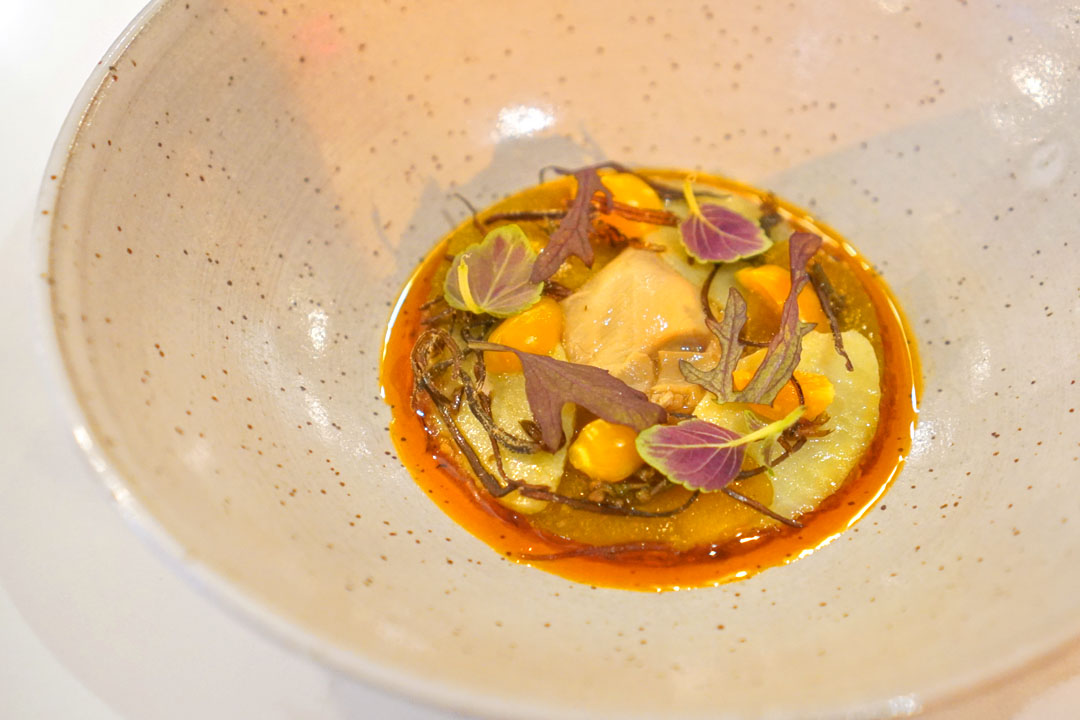
3: Confit Badger Flame Beets | Sweet Potato XO, Perilla Capers, Kelp
My oyster course was a winner, with the brine of the bivalve really standing up to the sweetness of those beets. I appreciated the freshness imparted by the shiso as well, but my favorite component was that XO sauce, which conveyed both sweetness and a wonderfully nutty depth--it really brought the dish together.
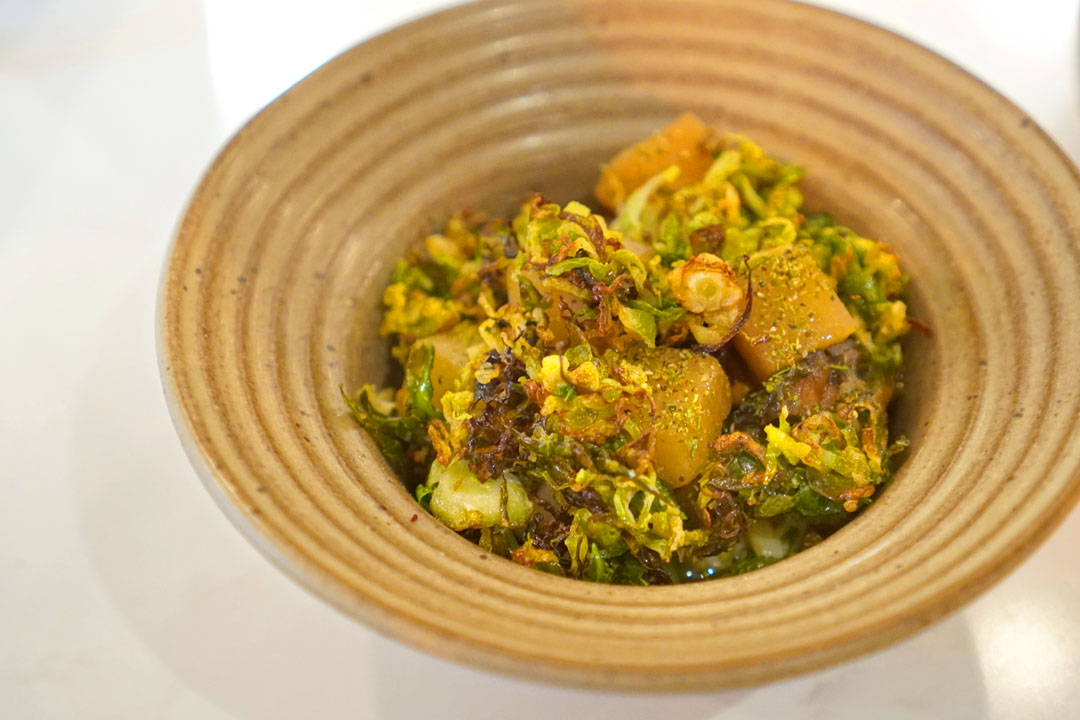
4: Koji Marinated Kohlrabi | Foraged Mushrooms, Cauliflower, Chervil
This next dish was another highlight, and featured kohlrabi marinated overnight in koji, roasted for caramelization, then slow-poached in a broth made from kohlrabi scraps. The veggie was paired with puréed cauliflower as well as a medley of roasted mushrooms (lion's mane, blue oyster, black king trumpet, pioppini, chestnut). This all made for a super cozy, comforting course with a bevy of buttery, bitter, nutty, and savory flavors all working in harmony.
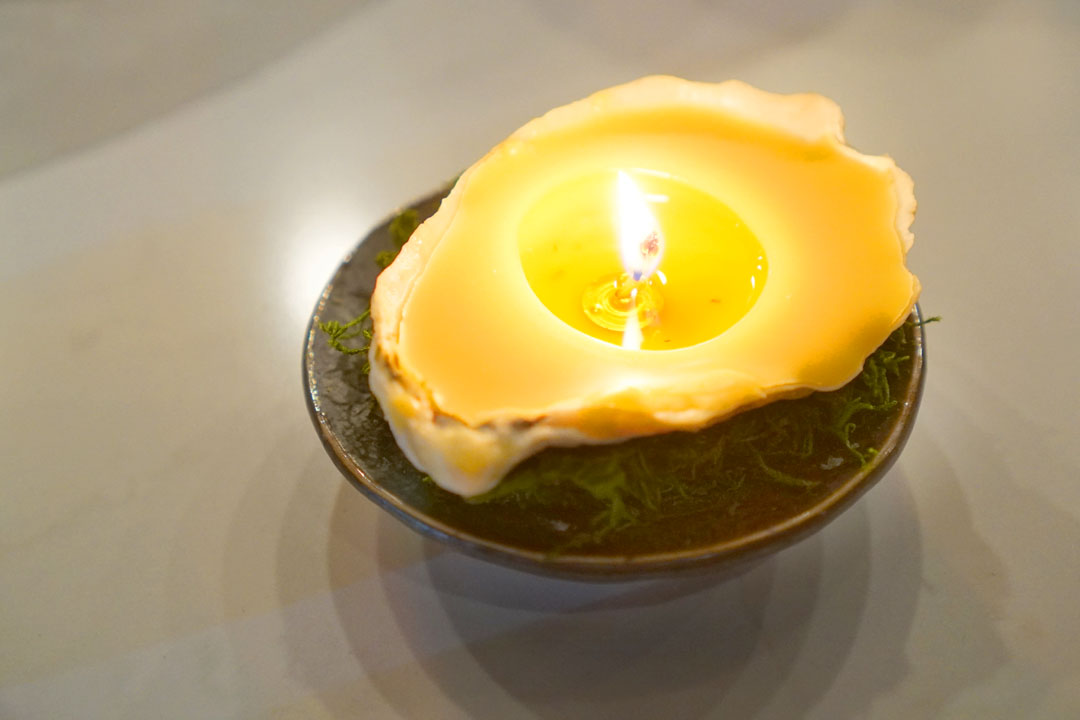
Discarded oyster shells are turned into candles, and I believe even the wax is made from used cooking oil.
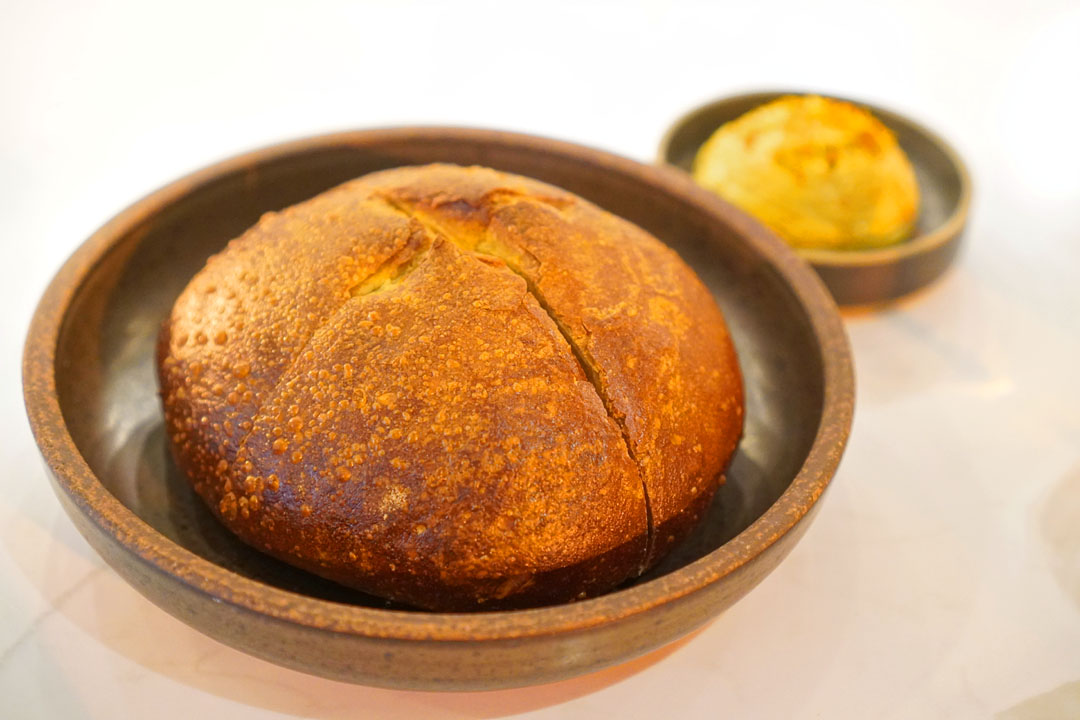
5: Badger Flame Beet Bread | Marigold "Butter"
Along with the kohlrabi came the bread, which had this delightful crustiness to it, while its crumb was properly tender, with a subtle, earthy bitterness thanks to the use of juiced beet scraps for dough hydration. The butter was also commendable. Made from sunflower seeds and marigold flowers, it had a gratifyingly thick consistency, with a smoky, nutty, almost "cheesy" taste that I reveled in.
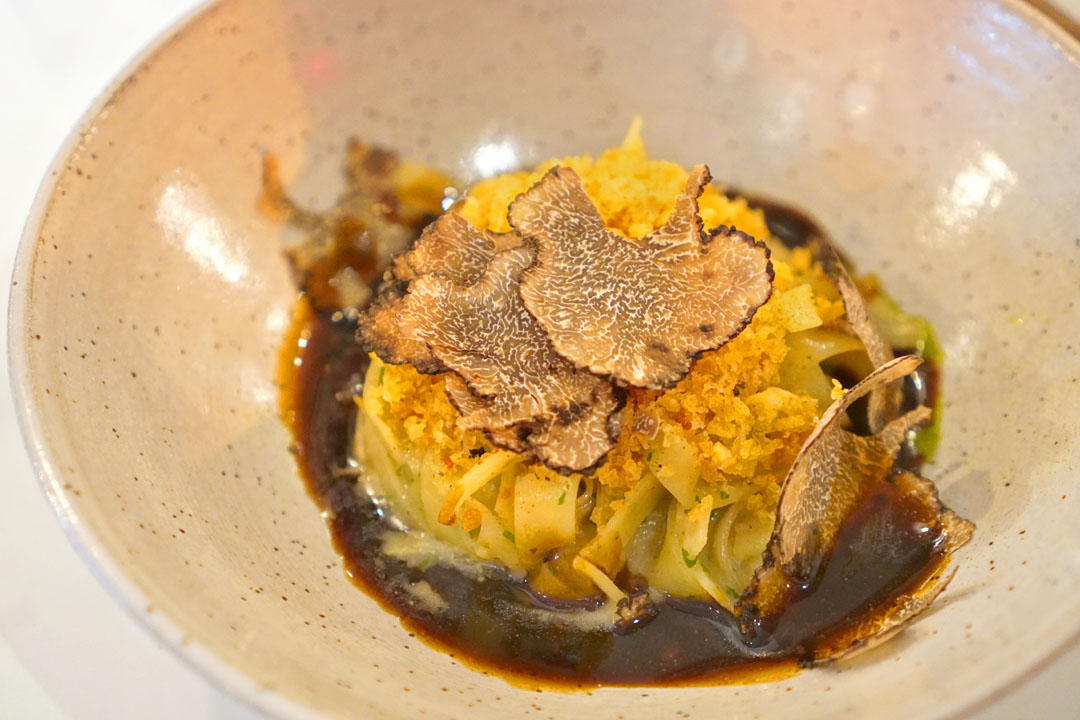
6: Potato | Truffle, Terra-Cotta, Vegetable Reduction
Celery root noodles were spot-on texturally, and were paired with a creamy, nearly cheesy "terra-cotta" made from pumpkin seeds. I was a big fan of the salt and crunch provided by the fried potato bits, while a rich, demi-glace-ish veggie reduction made from carrot/onion scraps (caramelized, then cooked down with red wine, garlic, and herbs) helped bind everything together. However, what struck me the most here was that North Carolina truffle, which had apparently been in work for 30 years. The shavings had this super pungent, almost lactic funk that I loved, which served as the perfect exclamation point to the dish.
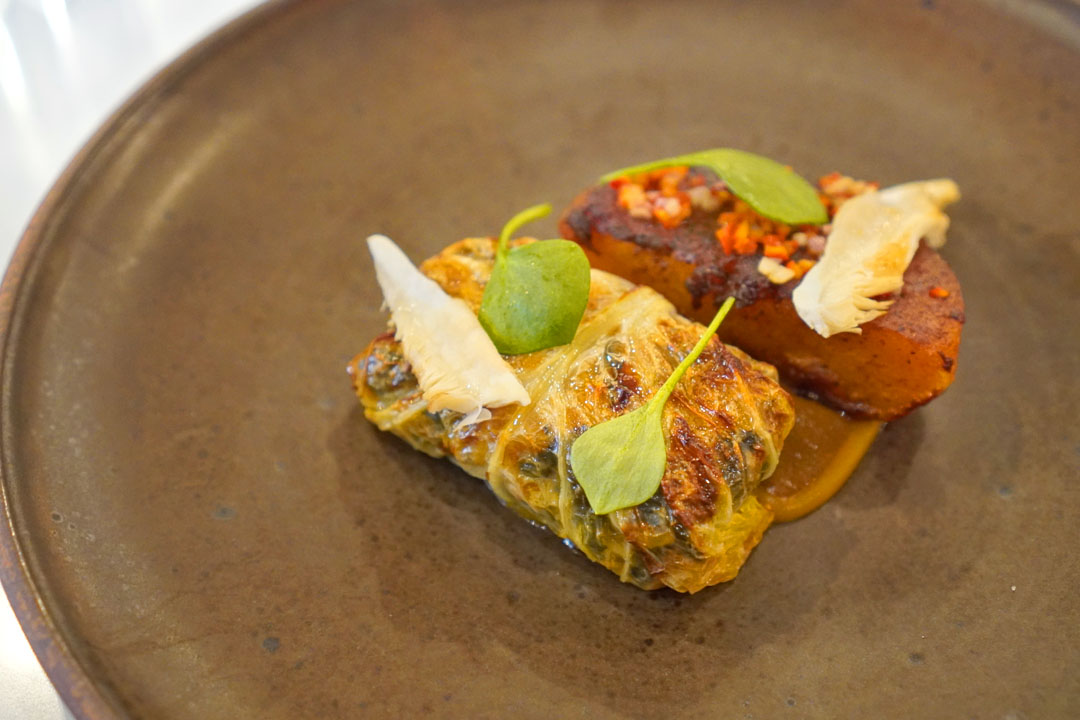
7: Stuffed Cabbage | Koginut Squash, Cypress Rice, Sauce of Seeds
My final savory course was a two-parter. In the front was Savoy cabbage, stuffed with a sticky, super nutty, aromatic rice that I was pretty enamored with, along with braised greens. I also had a subtly sweet semicylinder of roasted squash, topped with a wonderfully nutty, chocolate-y, mole-like sauce based on sesame and pumpkin seeds. Meanwhile, garnishing both parts were matsutake mushrooms, which were as spicy and "wild" tasting as I was hoping for.
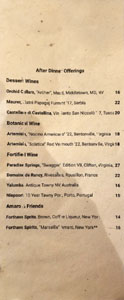
I requested a list of after-dinner beverages to pair with dessert below. Click for a larger version.
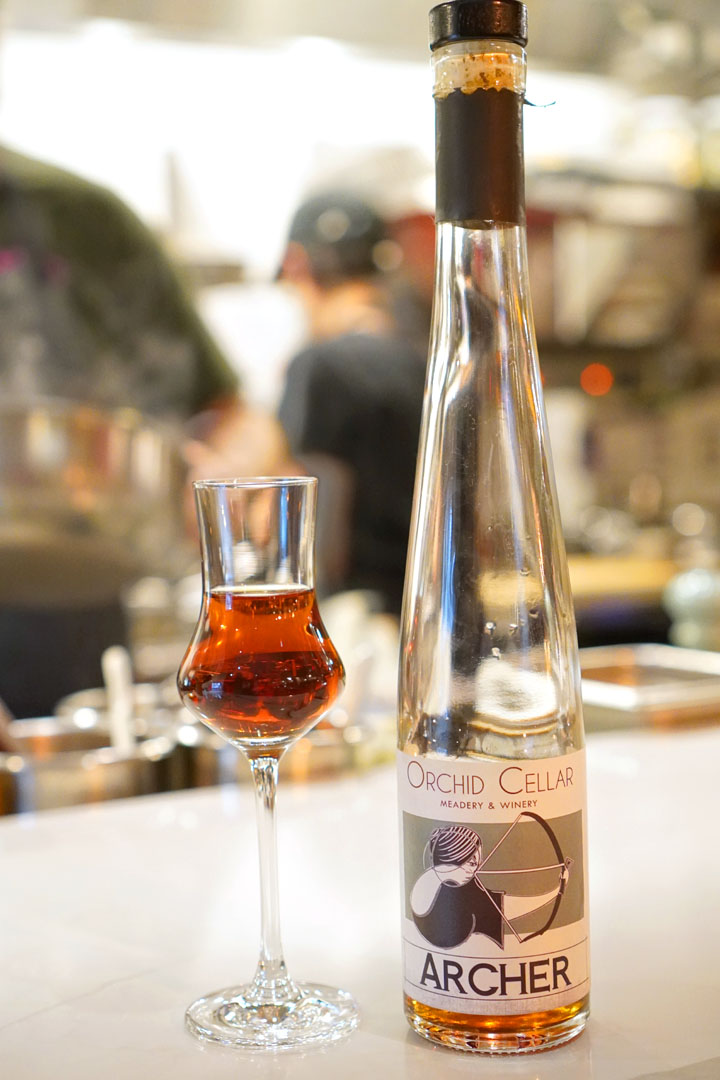
Since I was in the mood for something different, I choose the Orchid Cellars, "Archer", Mead, Middletown, MD, NV [$16], a honey-lemon wine fermented with cinnamon, clove, and juniper, then aged 18 months. The metheglin demonstrated a minty, fruity bouquet with an almost amaro-like character. Taste-wise, I got heady notes of cacao and bittersweet spices, all layered over a honeyed backbone.
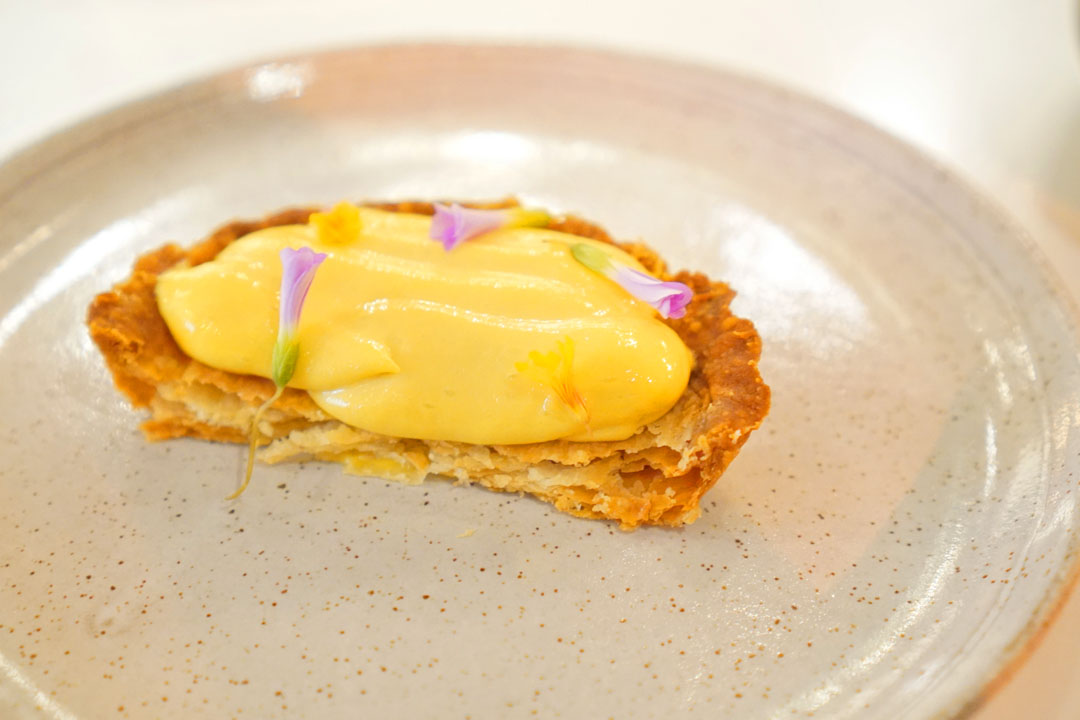
8: Paw Paw Tart
I feel that pawpaw is an underutilized native ingredient, so I was happy to see it on the menu tonight. Combined with bitter lemon vinegar and crème anglaise, the fruit had this tropical, yet earthy quality that I really enjoyed, and which married easily with that crispy, flaky buckwheat shell.
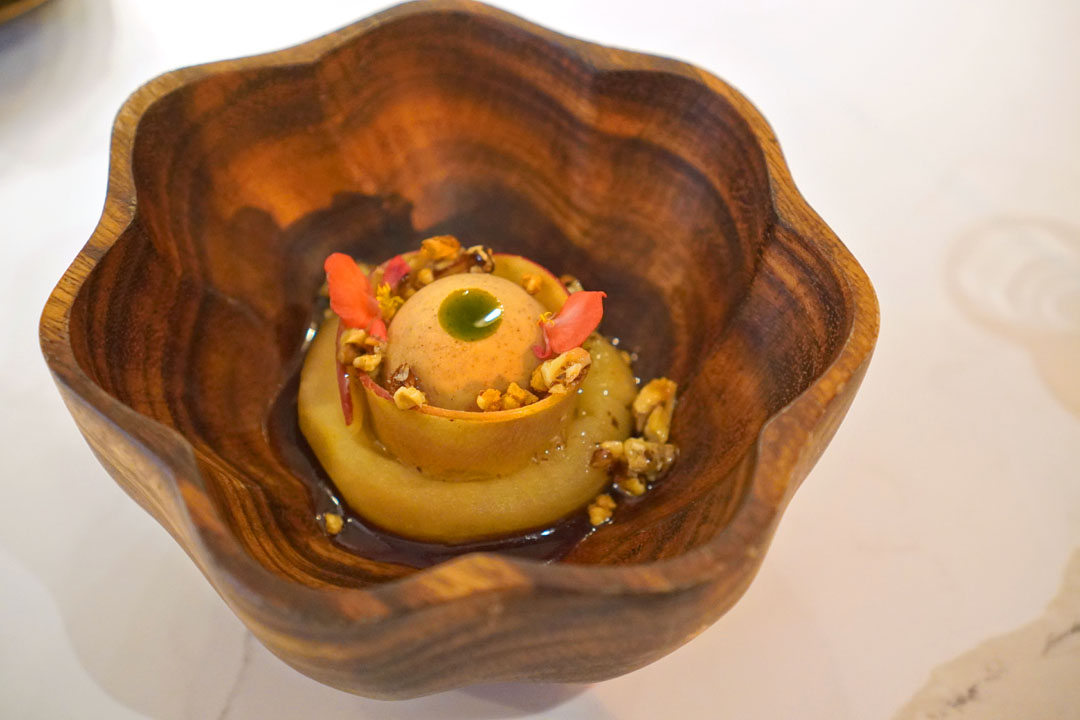
9: Apple | Apple Cake, Hickory Nut Mousse, Buckwheat
My second dessert was very apropos for the season. I was impressed by its caramel-like richness and how the juiciness of Pink Lady apple was presented. Just as important was that nutty mousse made from foraged hickory nuts, while a drizzle of grassy fig leaf oil and a sprinkling of crispy candied buckwheat completed the package.
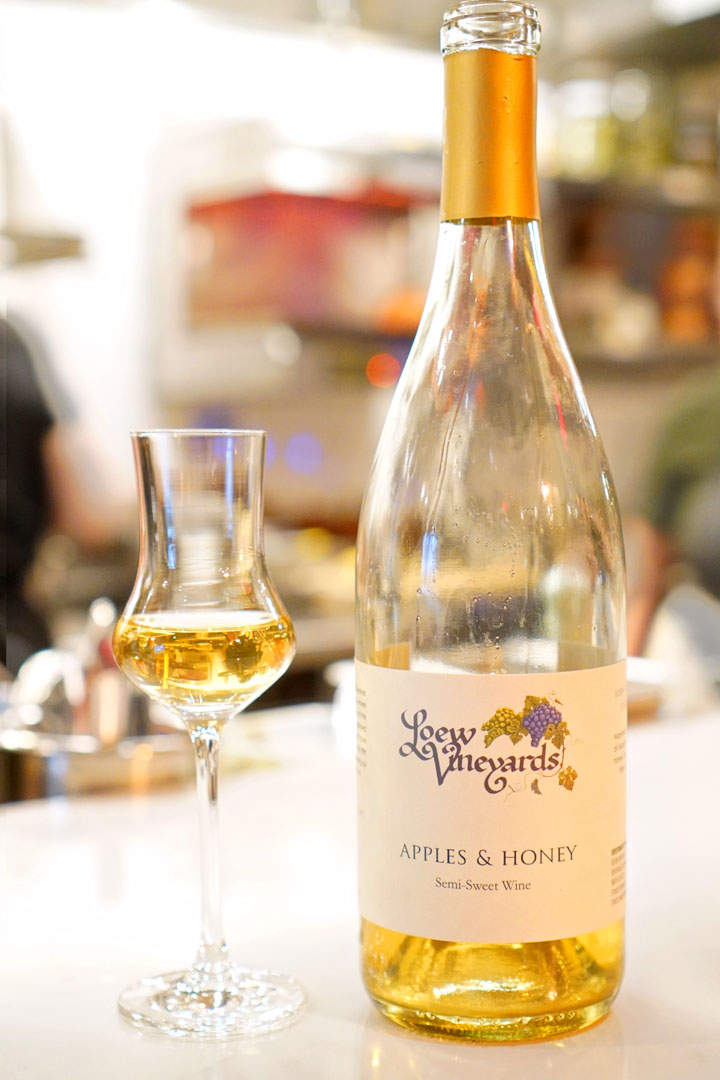
I was then provided a complimentary pour of the Loew Vineyards, "Apples & Honey", Cyser, Mt. Airy, MD, NV, made from a blend of apples and both wildflower and clover honey. The bouquet here was fresh and sweet, and actually reminded me of apple pie. Taste-wise, I found this generally easy-going, with tart fruit supported by an undercurrent of blue cheese-like earthiness.
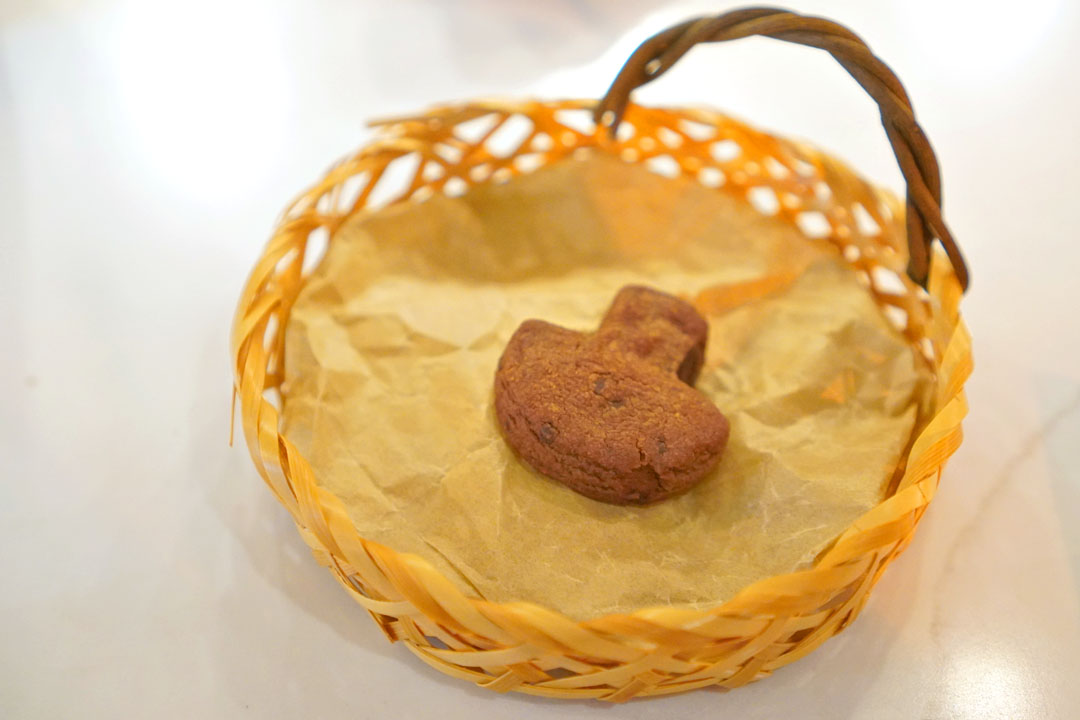
10: Shiitake Chip Cookie
Last up was a whimsical bite that married your classic cookie flavors with some unexpectedly woodsy, nutty nuances.
Rubba and his team delivered a strong meal tonight, and I can see why so many people like this place. The cuisine was inventive and intentional, invigorating and imaginative, and I definitely got that sense of sustainability that's part of Oyster Oyster's mission. There's a real sense of confidence in the cooking, and not once did I miss the meat. This is vegetarian food that shouldn't leave the meat-eaters wanting.